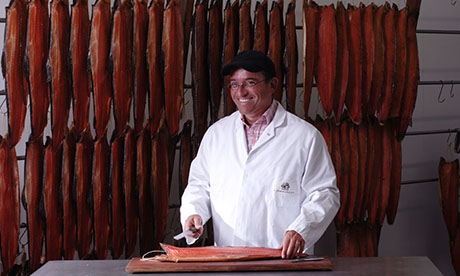Salmon smokery H. Forman & Son in the pink over protected status
“Other things, maybe not, but smoked salmon – I get it.”
Lance Forman certainly has credentials when it comes to ‘the king of fish’. For four generations his family has been smoking Scottish salmon in the East End, going back over a century.
Pending an EU rubber stamp, the firm is about to celebrate another milestone, as H. Forman & Son’s smoked salmon is set to join the likes of the Melton Mowbray pork pie by becoming the first London food to be awarded protected status under one of three Europe-wide schemes that aim to protect the unique heritage of top quality local foodstuffs across
the continent.
Status symbol
H. Forman & Son is the go-to smokehouse for some of London’s top chefs and restaurants, keeping the Savoy and Dorchester hotels, as well as the House of Lords, well-stocked from their new headquarters in Fish Island.
The firm’s flagship London Cure is to be awarded PGI (Protected Geographical Indication) status, in recognition of a unique and simple recipe (the finest salmon, a little rock salt, and no sugar) devised by Forman’s great-grandfather Harry, who first set up shop in Stepney Green in 1905.
Forman sees PGI status as recognition of the firm’s uncompromising approach to quality, and an opportunity to protect and re-establish the credentials of the Scottish salmon smoking as an artisanal process, in the face of supermarket-led mass production. This kind of production Forman blames for turning people off what was once a staple food of the East End’s Jewish communities, calling it “a world away from the traditional product”.
“If you go back to the origins of smoked salmon, the reason it was smoked was simply to preserve it. And how do you preserve it? You put it in salt, but that draws out ten per cent of the weight, and you smoke it and that draws out another ten per cent.
Weight watchers
“If you’re selling it by the kilo, and you’ve lost twenty per cent of the weight, you’ve lost twenty per cent of your turnover. Modern commercial producers try to avoid that weight loss – if they can sell water for the price of salmon, that’s great business.”
For Forman, “all these techniques are moving away from the original product”. And while he’s on a roll, he points to another trick of the trade: “I read on the back of supermarket packets: ‘after we catch our salmon, we leave it for three days to mature’… Fish does not mature, all right? Fish goes off. Meat, cheese, wine – ok, they mature. Fish doesn’t.” There’s more, too – mechanical filleting and added sugar take turns in his crosshairs.
A report produced for the European Commission found that, on the whole, protected status means a higher price for consumers, which in turn puts more money in the pockets of local producers. Better yet for Hackney, however, a protected status was found to have a positive economic effect on the area in which it was awarded.
H. Forman & Son employs over sixty staff, mostly drawn from the local area, and Forman is proud to lead what he calls a“labour-intensive business”.
Retailers around Hackney are enjoying the benefits of a world-class product on their doorstep too.
Rob Seigler, owner of the Market Cafe on Broadway Market, remembers how his dad used to frequent a Jewish deli supplied by Forman.
“Everyone would queue up there to buy their salmon. I remember as a little boy, standing at the counter, tasting it straight off the carving knife.
“It’s a top quality product, right on our doorstep, with local heritage and a proud tradition, and we wouldn’t serve anything else.”

